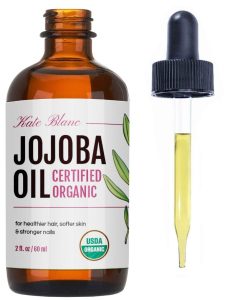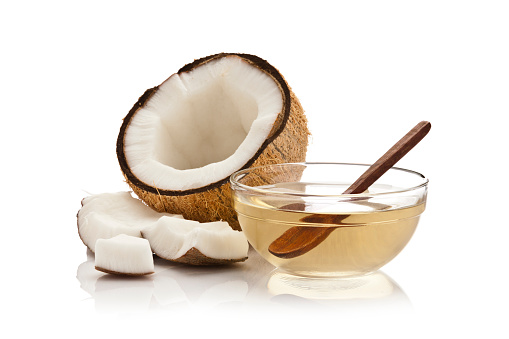Jojoba oil and almond oil are two popular carrier oils used in a variety of natural skin care products.
Both oils make a great addition to your collection as they can be mixed with essential oils or other ingredients to create your own organic DIY beauty treatments.
Since it can be hard to determine a winner between Jojoba Oil Vs Almond Oil, this guide has been created to give you a better idea of how these two oils compare based on the benefits which each oil offers, some possible uses for each oil, and some possible substitutes.
Contents
- 1 What Is Jojoba Oil?
- 2 What Is Almond Oil?
- 3 Jojoba Oil Vs Almond Oil: Major Differences
- 4 Which Is Better: Jojoba Oil Vs Almond Oil?
- 5 Jojoba Oil Vs Almond Oil Benefits
- 6 Jojoba Oil Vs Almond Oil For Skin
- 7 Jojoba Oil Vs Almond Oil For Hair
- 8 Jojoba Oil Vs Almond Oil For Cooking Use
- 9 What Skin Types Are Suitable For Jojoba Oil Vs Almond Oil?
- 10 Can We Mix Almond Oil And Jojoba Oil?
- 11 Jojoba Oil Vs Almond Oil: Side Effects
- 12 Jojoba Oil Vs Almond Oil: Conclusion
What Is Jojoba Oil?
Jojoba oil is pressed from the seeds of Jojoba shrubs which are native to the deserts of southwestern America.
These shrubs are very similar to human sebum, which makes jojoba oil a great ingredient for skin care products as it has properties similar to those found naturally on the skin.
Jojoba oil is often recommended as a great carrier oil for people with sensitive skin, because it’s gentle and mild.
It’s also considered to be an effective treatment for psoriasis, eczema, acne and other skin complaints. Jojoba oil has a high vitamin E content which can help protect the skin from damage.
What Is Almond Oil?
Almond oil is pressed from the kernels of almonds. Almond oil contains plenty of antioxidants which can fight free radicals, moisturize skin and lock in moisture with vitamins A, D, and E.
It’s especially beneficial for dry skin, acne prone skin or dermatitis as it can help ward off itching and irritation.
Almond oil also acts as a natural sunscreen due to its ability to absorb ultraviolet light without blocking it like mineral sunscreens do.
Some people prefer almond oil over other oils because it has a very subtle nutty scent which isn’t too overpowering or noticeable.
Some brands use synthetic fragrance to make their almond oils smell better but the best quality almond oils will have a naturally sweet delicate scent from the cold pressing process.
Jojoba Oil Vs Almond Oil: Major Differences
There are a few key differences between jojoba oil and almond oil.
Almond oil is slightly more moisturizing which makes it magical for your skin, while jojoba oil has better absorption properties which is why it’s often used as a carrier oil in aromatherapy and massage oils.
Jojoba oil can also help control acne on the back and body whereas almond oil might not be as effective due to its ability to clog pores at times.
Jojoba oil is clear and colorless so it doesn’t change the color of your skin or leave an oily residue on top of the skin like almond oils can do under certain circumstances.
Below, we are going to differentiate between these oils based on several important factors that will help you understand the Jojoba Oil Vs Almond Oil thing better:
1. Texture And Appearance
Both jojoba oil and almond oil will leave a slightly oily residue on the skin, but almond oil can feel a lot more greasy while jojoba oil might be absorbed into the skin better.
Almond oils are thicker while jojoba oils tend to be lighter and more fluid in texture.
Related Video – Jojoba And Almond Oil As Moisturizers
2. Shelf Life
The shelf life of jojoba oil is around 5-6 years and it tends to last longer than that of almond oil as it has a much slower oxidation process which means your product won’t become rancid nearly as quickly.
Jojoba oils have been known to last up to two years when kept in their original container with a tight seal and stored away from heat or light sources.
Almond oils will normally keep for about one year before they start to oxidize and lose their therapeutic properties.
3. Comedogenicity
Those who have experienced a reaction from using products containing almond oil might suffer from acne due to almond oils ability to clog pores quickly.
Jojoba oil is considered comedogenic as well but only by a small percentage of people, making it safer for those with sensitive skin types.
In general, both jojoba oil and almond oil are good choices but if you’re looking specifically for an acne fighting product then almond oil might not be the best choice because of its pore clogging capabilities.
4. Price And Availability
Almond oil is usually quite a bit cheaper than jojoba oil so it’s more popular for use in household beauty recipes while jojoba oil tends to be more expensive.
You can buy both online or at health stores but almond oil is also available in most grocery stores while jojoba oil might only be found in high end beauty supply shops.
5. Anti-Bacterial Properties
Both almond oil and jojoba oil have anti-bacterial properties that help kill off germs and fight acne causing bacteria. Jojoba oil has a stronger anti-microbial effect than almond oil but both work well in this department.
6. Skin Penetration Ability
Almond oil penetrates the skin better than jojoba oil does, which is why it’s sometimes used as a carrier to dilute and carry essential oils and other products onto the skin, especially if you’re looking for an all natural sunscreen option.
7. Anti-Inflammatory Properties
The high Vitamin E content of almond oil makes it stronger for fighting inflammation related conditions such as dermatitis or eczema than Jojoba oil might be on its own.
Both oils will work well if you’re mixing them with citrus essential oils however to increase their anti-inflammatory properties.
8. Eczema And Psoriasis Treatment
Almond oil has stronger anti-inflammatory effects than jojoba oil does, which makes it better suited for conditions like eczema and psoriasis, but it’s also more likely to cause clogged pores or acne breakouts in those who are sensitive to this type of oil.
Jojoba is less likely to cause breakout problems because it has a relatively low chance of clogging pores which makes it better for most skin types including dry skin types which tend to be more vulnerable to sensitivities related to pore blocking ingredients in many beauty products.
9. Emollient Properties
Both almond oil and jojoba oil are good for conditioning the skin which is why some people will apply them directly to the skin without diluting them in any way.
Keep in mind that jojoba oils pore-clogging capabilities might be a bit stronger than that of almond oil, so always do a patch test before applying or mixing with other products just to be on the safe side.
10. Hair Care And Treatment
Almond oil makes for an excellent carrier oil when mixed with essential oils because it helps carry their therapeutic constituents deeper into the water layers of your hair follicles which helps strengthen your hair, making it shinier and thicker over time.
It’s also easier to find and much cheaper than jojoba oil which makes it a better option for general hair care needs.
Which Is Better: Jojoba Oil Vs Almond Oil?
The answer to this question depends on your skin type and your hair needs.
Almond oil is better for those with oily skin types who are looking for an acne fighting product, while jojoba oil might be a better option for sensitive skin types or those looking to control sebum production without causing breakouts.

If you have dry skin then almond oil might work well but keep in mind that jojoba oil penetrates the surface of the skin better, so it’s stronger as an emollient moisturizer.
If you’re looking for anti-inflammatory properties then almond oil is a strong choice because it has more Vitamin E content than jojoba oil does, making it a good choice for eczema and psoriasis treatment.
In general, though, both oils will work well as carriers for essential oils and as skin moisturizers, so you can’t really go wrong with either choice.
Jojoba Oil Vs Almond Oil Benefits
Jojoba Oil Benefits
- It is an excellent moisturizer, containing natural Vitamin E and fatty acids that mimic your skin’s sebum.
- It has antibacterial properties which help balance the bacteria on your face without compromising its health like harsh antibacterial products might.
- It can reduce inflammation caused by acne or other skin conditions because it doesn’t clog pores, so you don’t have to worry about purging or allergic reactions when using Jojoba oil for acne prone skin treatments .
- Jojoba is naturally hypoallergenic which makes it suitable for sensitive skin types that often struggle with regular face product use. This makes jojoba perfect for those who are prone to eczema or psoriasis.
- Jojoba is noncomedogenic, meaning it won’t clog pores, which makes it great for acne sufferers where other oils might actually make their acne worse because of pore clogging capabilities.
- It boosts collagen production which reduces wrinkles and signs of aging on your face.
Almond Oil Benefits
- Almond oil contains Vitamin E like jojoba oil does too, making it another good emollient moisturizer option that helps reduce fine lines and wrinkles on your face caused by dryness or age-related changes to the skin’s structure over time.
- Almond oil contains a significant amount of linoleic acid which helps protect against sun damage from ultraviolet rays, helping to reduce signs of aging like fine lines and wrinkles.
- It can be used to treat eczema and psoriasis by reducing dry, scaly skin.
- Almond oil is also a strong anti-inflammatory agent which makes it useful for the treatment of acne.
- It can help fight dandruff significantly because of its anti-fungal properties, meaning you won’t have to worry as much about the oil clogging pores or causing further acne breakouts.
Jojoba Oil Vs Almond Oil For Skin
Almond oil is better for those with dry skin types, while jojoba is better suited to those with oily skin.
Both oils are good emollient moisturizers that can prevent fine lines and wrinkles from forming on your face due to age related changes in the skin’s structure over time.
Almond oil reduces inflammation from acne and other skin conditions because it doesn’t clog pores, so it’s good for people with acne prone skin.
On the other hand jojoba oil penetrates the surface of the skin better than almond oil does which makes it stronger in terms of anti-inflammatory properties.

Both oils are good for use as carriers when making essential oils or face products at home, they won’t go rancid like vegetable-based oils will over time which makes them superior to most carrier oils on the market.
Jojoba oil is naturally hypoallergenic which means that it is suitable for use on sensitive skin types that often struggle with regular face product use.
This also makes jojoba perfect for people who are prone to eczema or psoriasis.
Almond oil is noncomedogenic which means that it won’t clog pores making it great for acne sufferers where other oils might actually make their acne worse because of pore clogging capabilities.
Almond oil contains Vitamin E like jojoba oil does too, so it’s good for fighting wrinkles and fine lines on your face caused by dryness or age related changes to the skin’s structure over time.
Jojoba Oil Vs Almond Oil For Hair
Both oils make good hair conditioners and treatments for dry hair if you add a few drops to your regular hair care routine.
Almond oil is better for those with dry hair types, while jojoba is better suited to those with oily hair.
Jojoba oil is naturally hypoallergenic which means that it is suitable for use on sensitive skin types that often struggle with regular hair care product use.
As hair care items, both oils are good for fighting frizz, adding shine to dry hair and fighting split ends.
Almond oil reduces inflammation from dandruff or other scalp conditions because it doesn’t clog pores, so it’s good for people with acne prone skin.
On the other hand jojoba oil penetrates the surface of the skin better than almond oil does which makes it stronger in terms of anti-inflammatory properties.
Both oils are good carrier options when making homemade hair care products like shampoos or conditioners at home, they won’t go rancid over time like vegetable based oils will which makes them superior to most carrier oils on the market.
Jojoba Oil Vs Almond Oil For Cooking Use
Both oils make good cooking oils, which means they won’t go rancid like other high polyunsaturated fat oils might after prolonged use.
Both oils are good for deep frying because of their high smoke points (which is around 446°F).
Almond oil has a higher smoke point and is thus better for cooking food types that require the oil to maintain its integrity at high temperatures.
What Skin Types Are Suitable For Jojoba Oil Vs Almond Oil?
Almond oil is better for those with dry skin types, while jojoba is better suited to those with oily skin.
Jojoba oil contains Vitamin E like almond oil does too, so it’s good for fighting wrinkles on your face or on your body caused by dryness or age related changes to the skin’s structure over time.
Can We Mix Almond Oil And Jojoba Oil?
Yes, you can mix both oils together as carrier options for essential oils or face products at home.
Jojoba Oil Vs Almond Oil: Side Effects
One of the biggest concern many have when it comes to discussion on Jojoba Oil Vs Almond Oil is understanding their side effects. Let us put this to rest, both oils are perfectly safe for topical use.
Almond oil is noncomedogenic which means that it won’t clog pores making it great for acne sufferers where other oils might actually make their acne worse because of pore clogging capabilities.
Jojoba oil is naturally hypoallergenic which means that it is suitable for use on sensitive skin types that often struggle with regular face product use.
This also makes jojoba perfect for people who are prone to eczema or psoriasis.
Jojoba Oil Vs Almond Oil: Conclusion
Overall, both oils are good for skin care, hair care and cooking related uses.
Jojoba oil penetrates the surface of the skin better than almond oil does which makes it stronger in terms of anti-inflammatory properties.
Almond oil has a higher smoke point and is thus better for cooking food types that require the oil to maintain its integrity at high temperatures.
On the other hand jojoba oil reduces inflammation from dandruff or other scalp conditions because it doesn’t clog pores, so it’s good for people with acne prone skin.

![12 Best Jojoba Carrier Oils [REVIEWED] 12 Best Jojoba Carrier Oils [REVIEWED]](https://theoilvirtue.com/wp-content/uploads/2022/02/Cliganic-USDA-Organic-Jojoba-Oil-100-Pure-Natural-Cold-Pressed-Unrefined-Hexane-Free-Oil-For-Hair-Face-Base-Carrier-Oil-244x300.jpg)
![30 Best Jojoba Oil Shampoo [Reviewed] 30 Best Jojoba Oil Shampoo [Reviewed]](https://theoilvirtue.com/wp-content/uploads/2022/02/J·R·LIGGETTS-All-Natural-Shampoo-Bar-Jojoba-And-Peppermint-300x300.jpg)
![15 Best Jojoba Oil Body Oil [Reviewed] 15 Best Jojoba Oil Body Oil [Reviewed]](https://theoilvirtue.com/wp-content/uploads/2022/02/Jojoba-Oil-By-Leven-Rose-Pure-Cold-Pressed-Organic-Unrefined-Moisturizer-For-Skin-Hair-Body-Nails-And-Cuticles-300x300.jpg)
![20 Best Jojoba Oil Shave Oil [Reviewed] 20 Best Jojoba Oil Shave Oil [Reviewed]](https://theoilvirtue.com/wp-content/uploads/2022/02/The-Man-Company-100-Natural-Beard-Oil-For-Men-With-Almond-Oil-Thyme-Argan-And-Jojoba-Oil-300x300.jpg)

![15 Best Jojoba Oil Hair Oil [REVIEWED] 15 Best Jojoba Oil Hair Oil [REVIEWED]](https://theoilvirtue.com/wp-content/uploads/2022/02/Cliganic-USDA-Organic-Jojoba-Oil-100-Pure-Natural-Cold-Pressed-Unrefined-Hexane-Free-Oil-For-Hair-Face-243x300.jpg)
![10 Best Jojoba Oil Gallon [Reviewed] 10 Best Jojoba Oil Gallon [Reviewed]](https://theoilvirtue.com/wp-content/uploads/2022/02/Cliganic-Jojoba-Oil-Non-GMO-Bulk-Gallon-128oz-100-Pure-Natural-Cold-Pressed-Unrefined-Hexane-Free-Oil-For-Hair-Face-167x300.jpg)
![18 Best Jojoba Oil Soap [Reviewed] 18 Best Jojoba Oil Soap [Reviewed]](https://theoilvirtue.com/wp-content/uploads/2022/02/Cove-Castile-Soap-Unscented-Organic-Argan-Jojoba-And-Hemp-Oils-228x300.jpg)







